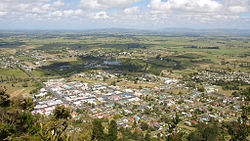Matamata-Piako District
Matamata-Piako District | |
|---|---|
 Te Aroha | |
 | |
| Country | New Zealand |
| Region | Waikato |
| District | Matamata-Piako District |
| Wards | Matamata Morrinsville Te Aroha |
| Seat | Te Aroha |
| Government | |
| • Mayor | Ash Tanner [1] |
| • Deputy Mayor | Neil Goodger[1] |
| Area | |
| • Total | 1,754.02 km2 (677.23 sq mi) |
| Population (June 2021)[2] | |
| • Total | 36,700 |
| • Density | 21/km2 (54/sq mi) |
| Time zone | UTC+12 (NZST) |
| • Summer (DST) | UTC+13 (NZDT) |
| Postcode(s) | |
| Website | Matamata-Piako District Council |
Matamata-Piako District is a local government area in the Waikato region of New Zealand. It lies to the east of the city of Hamilton.
Geography[]
The district encompasses the southern end of the Hauraki Plains and much of the Thames Valley, and is bounded in the east by the Kaimai Range. The rivers Piako and Waihou run through the district.
The towns of Matamata, Morrinsville and Te Aroha are all within the district, with the Council's head office based in Te Aroha. The main industry in the region is dairy farming and Thoroughbred breeding and training. Other communities in the district include Mangateparu and Waitoa.
The district's estimated population in June 2021 was 36,700,[2] of whom 8,410 lived in Morrinsville, 8,570 in Matamata, and 4,650 in Te Aroha.
Populated places[]
Matamata-Piako District consists of the following towns, localities, settlements and communities:
|
|
Demographics[]
| Year | Pop. | ±% p.a. |
|---|---|---|
| 2006 | 30,483 | — |
| 2013 | 31,536 | +0.49% |
| 2018 | 34,404 | +1.76% |
| Source: [3] | ||
Matamata-Piako District had a population of 34,404 at the 2018 New Zealand census, an increase of 2,868 people (9.1%) since the 2013 census, and an increase of 3,921 people (12.9%) since the 2006 census. There were 12,873 households. There were 17,001 males and 17,403 females, giving a sex ratio of 0.98 males per female. Of the total population, 6,999 people (20.3%) were aged up to 15 years, 6,186 (18.0%) were 15 to 29, 14,436 (42.0%) were 30 to 64, and 6,783 (19.7%) were 65 or older. Figures may not add up to the total due to rounding.
Ethnicities were 84.4% European/Pākehā, 16.7% Māori, 2.1% Pacific peoples, 5.7% Asian, and 1.7% other ethnicities. People may identify with more than one ethnicity.
The percentage of people born overseas was 14.4, compared with 27.1% nationally.
Although some people objected to giving their religion, 51.4% had no religion, 35.8% were Christian, and 4.8% had other religions.
Of those at least 15 years old, 3,204 (11.7%) people had a bachelor or higher degree, and 7,203 (26.3%) people had no formal qualifications. The median income was $32,400. The employment status of those at least 15 was that 13,566 (49.5%) people were employed full-time, 4,077 (14.9%) were part-time, and 876 (3.2%) were unemployed.[3]
Twin cities[]
Matamata-Piako is twinned with:
References[]
- ^ a b "Councillors and Mayor". www.mpdc.govt.nz. Retrieved 25 April 2020.
- ^ a b "Population estimate tables - NZ.Stat". Statistics New Zealand. Retrieved 22 October 2021.
- ^ a b "Statistical area 1 dataset for 2018 Census". Statistics New Zealand. March 2020. Matamata-Piako District (015). 2018 Census place summary: Matamata-Piako District
- ^ "Sister City Agreement". Archived from the original on 6 February 2011. Retrieved 10 July 2009.
External links[]
- Matamata-Piako District
